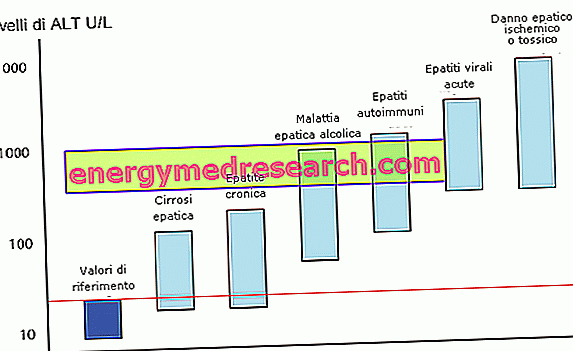Generality High fibrinogen in pregnancy is a common finding: this factor, essential for coagulation, increases month after month in the bloodstream, as an effect of the changes that occur in the woman's body during gestation. Therefore, up to the maximum reference value of 700 mg / dl, this parameter is considered in the standard
Category blood analysis
Generality Low uric acid indicates a reduced concentration of this metabolite in the blood or urine. Through the dosage of this compound it is possible to diagnose, monitor or prevent some diseases that may depend on the scarce capacity of our body to eliminate it correctly. In particular, reduced values of uric acid compared to the norm can be indicative of pathologies of the liver or kidney . Am
Generality Aldolase is an enzyme normally found in many tissues and organs (skeletal muscle, myocardium, liver and brain). In these districts, it participates in the production of energy from glucose . The circulating amount of aldolase can be detected with a blood test. An increase in enzyme values is indicative of some diseases related to skeletal muscle , including Duchenne muscular dystrophy and polymyositis. Th
Generality Alpha-phetoprotein (AFP ) is a glycoprotein substance with functions similar to those of albumin, synthesized above all during fetal life from the yolk sac and the liver. After birth, alpha-fetoprotein levels begin to fall significantly, reaching - within 12/24 months - the characteristic values of healthy adults (less than 5 ng / mL). Ou
Generality Alanine amino transferase , more simply known as ALT or SGPT (serum glutamic pyruvic transaminase), is an intracellular enzyme present in many tissues, especially in striated muscles, in the brain and especially in the liver. The alanine amino transferase assay in the blood is therefore a very useful test to evaluate liver function
Generality Ammonemia is a medical term that indicates the concentration of ammonia in the blood . Ammonia is a nitrogenous product that is formed in the body by the activity of many tissues, but for the most part comes from the metabolism of dietary proteins and from intestinal bacterial fermentations
What is Perniciosa anemia? Pernicious anemia is an anemic form due to vitamin B12 deficiency . Once quite widespread and difficult to treat, this particular anemia has gained the pernicious adjective due to its ability to cause serious damage and important harmful effects. Today, fortunately, pernicious anemia has become rather rare and easily treated
Types of Anemia Anemias are classified according to alterations in the morphology of erythrocytes (red blood cells) and erythrocyte indices. Whatever the nature of anemia, the reduction in the erythrocyte mass and oxygen carrying capacity, if sufficiently severe, leads to some very specific clinical characteristics
What is sickle cell anemia? Sickle cell anemia is a genetic disease of the blood, so defined by the characteristic sickle shape taken, in particular circumstances, by the sick red blood cells. This peculiarity is in contrast with the typical shape - a biconcave disk, elastic and easily deformable - of mature erythrocytes, which allows them to pass undisturbed in the narrow lumen of the blood capillaries
Generality The World Health Organization (WHO) has defined the concept of anemia as a hemoglobin value of less than 14 g / dl in humans, 12 g / dl in women and 11 g / dl in pregnant women. Among the many causes of anemia, iron deficiency is the most common. Not surprisingly, iron deficiency probably represents the most widespread nutritional alteration in the world
Antiphospholipid Antibody Syndrome The "Anti-phospholipid Antibody" Syndrome (APA Syndrome) is a clinical condition associated with the predisposition to arterial and venous thrombosis, and to recurrent spontaneous abortions, characterized by thrombocytopenia and the presence in the circulation of particular antibodies, called antiphospholipids









